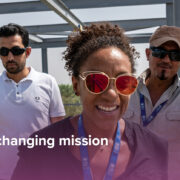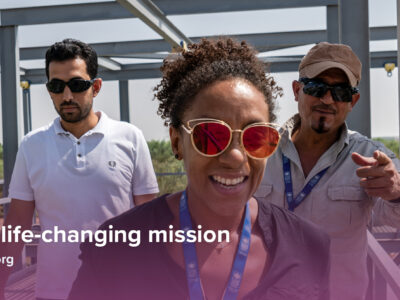UN Women, grounded in the vision of equality enshrined in the Charter of the United Nations, works for the elimination of discrimination against women and girls; the empowerment of women; and the achievement of equality between women and men as partners and beneficiaries of development, human rights, humanitarian action and peace and security. UN Women’s engagement in humanitarian action and peacebuilding is to ensure consistency and sustainability in addressing gender equality concerns across the humanitarian-development continuum. The importance of gender integration in humanitarian response, post-conflict reconstruction and peacebuilding is embedded in the United Nations Security Council Resolution 1325, the ground-breaking resolution that acknowledges the impact of conflict on women, and also recognizing the importance of utilizing women’s contribution and active participation in conflict prevention, peace-building and relief and recovery efforts.
UN Women has a strong mandate on gender in emergencies and ensures that humanitarian response, development and peacebuilding efforts adequately address the needs and rights of crisis affected women and girls, in all aspects. It provides evidencebased information that supports UN and other humanitarian actors, as well as member states engaged in humanitarian action, to ensure that their interventions meet both the immediate life-saving and longer-term recovery and development needs of women and girls. UN Women supports post-conflict needs assessments, post-conflict planning processes and financing frameworks that put women’s participation and concerns at the centre of recovery and peacebuilding.This offers the organization the unique opportunity to foster social change, engage national stakeholders in the planning and execution of institutional reforms to empower women and promote gender equality. UN Women seeks to achieve inclusive and gender-responsive humanitarian responses by working with governments, other UN agencies, International non-Governmental Organizations and Civil Society Organizations (CSOs), particularly Women-Led Organizations.
Background/Context
The conflict in Northeast Nigeria has been largely attributed to bad governance, underdevelopment, exclusion, and injustice, deeply rooted in inequalities that have systemically marginalized women and young people. Whilst humanitarian response efforts have mostly addressed the immediate survival needs of conflict-affected women and girls, basically linked to food, water, shelter and other protection requirements, the ‘strategic’ needs which provide them control over their lives and address pre-existing gender-based inequalities have received limited attention. Nonetheless, programming is required beyond ‘life-saving’ activities to include the under-lying causes of vulnerability.
Moreover, the conflict has deliberately targeted women and girls in specific and diverse ways, which have also consequently manifested in various forms of gender inequalities. The resentment and targeting of formal education by Non-Sate Armed Groups (NSAGs) has created fear among populations living in conflict-affected areas, resulting in low school enrolment and attendance, especially among girls. The large-scale kidnappings of 276 school girls in Chibok, Borno State in 2014, and over 100 girls from Dapchi in Yobe State in 2018, are typical examples of how the conflict particularly targets girl child education in North-East Nigeria. This loss of opportunity for girls and young women to gain education in order for them to develop their full potential and participate meaningfully in society has implications on gender equality upshots. The cultural and traditional practice of early marriage and early child bearing has been worsened by the conflict. The number of child brides has increased as marriage is considered a means of ‘protection’ for girls in order to ensure social security and reduce responsibilities for families. Young girls are also deliberately getting pregnant in order to avoid being abducted by NSAGs whose preference is high for virgins.These girls are further exposed to sexually transmitted infections and maternal mortality during pregnancy. In addition, women and girls who walk long distances to collect firewood and water are at risk of abduction and sexual violence, thereby limiting freedom of movement which in turn affects their livelihoods. Whilst men and boys are recruited for fighting and stand higher risk of been killed, women and girls are vulnerable to sexual violence and unwanted pregnancies. Despite grappling with the difficulties of single-motherhood, they are faced with new challenges of stigmatization when they survive and return to their communities, and these treatments are also extended to their children. These survivors quite often adopt negative coping mechanisms, including survival sex, substance abuse, and in some cases, re-joining NSAGs, even though they do not provide them the ideal environment for sustainable development.
Notably, since the inception of the conflict in 2009 and the initiation of humanitarian response, several organizations have undertaken rapid gender analyses to underscore the importance of gender differentials in the vulnerability and coping mechanisms of conflict-affected populations, as well as transformation of gender relations, in order to guide emergency response efforts. However, limited comprehensive research has been undertaken on the effects of the conflict on longer-term gender disparity, especially owing to pre-existing inequalities between men and women, boys and girls. Interventions by relief agencies also need to be examined to ascertain how they have impacted gender relations and gender equality results. More significantly, the crisis has impacted women and girls in varied ways, including increased numbers of child marriage, early pregnancies, sexual and gender-based violence; which require investigation to make reasonably accurate predictions on what the average woman and adolescent girl would likely be, or be capable of doing by 2030. To this end, the complex and multi-faceted nature of the impact of the crisis and response mechanisms require a robust and comprehensive research that will unravel deep-rooted beliefs and practices that continue to undermine gender equality efforts; as well as emerging gender concerns, relations and transformations as a result of the crisis; and valuable recommendations that would amend the damage, and accelerate efforts on gender equality outcomes.
The Research is therefore specifically intended to envision or make predictions (based on evidence generated from the current realities) on what the average woman and present adolescent girl would become in the next 20 years (2030 ), which is a significant benchmark for the attainment of the UN Sustainable Development Goals/ The 2030 Agenda. It will also provide recommendations on appropriate interventions that could be undertaken to curtail and mitigate the medium and longer term impact of the conflict on women and girls, ensuring that this critical mass is not left behind in post-conflict reconstruction and national development efforts. The Research will further identify gender transformative actions that have occurred during











Comments